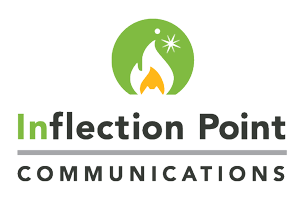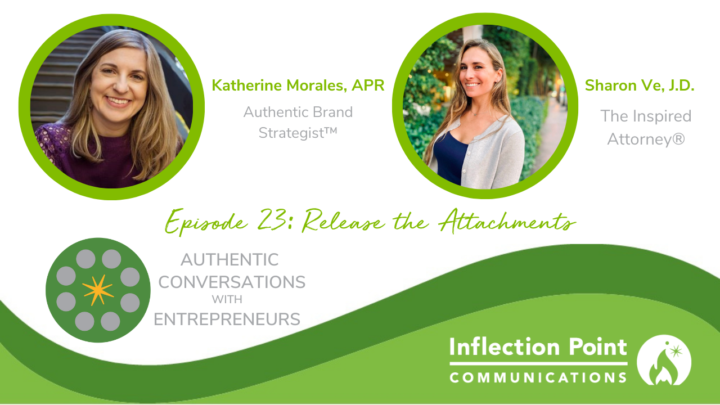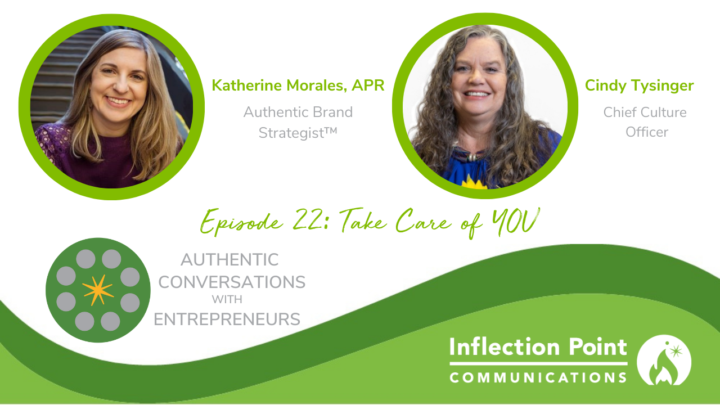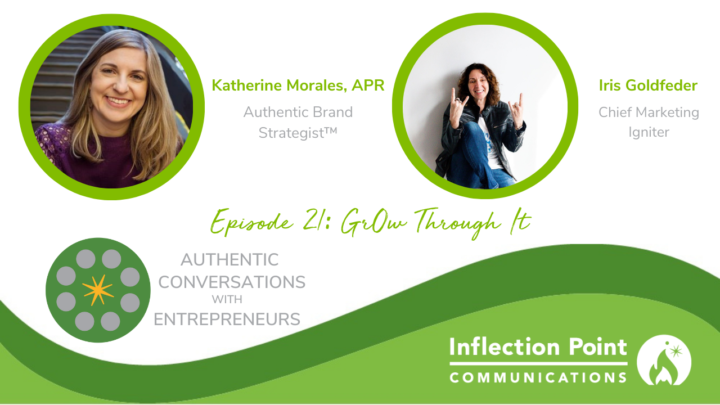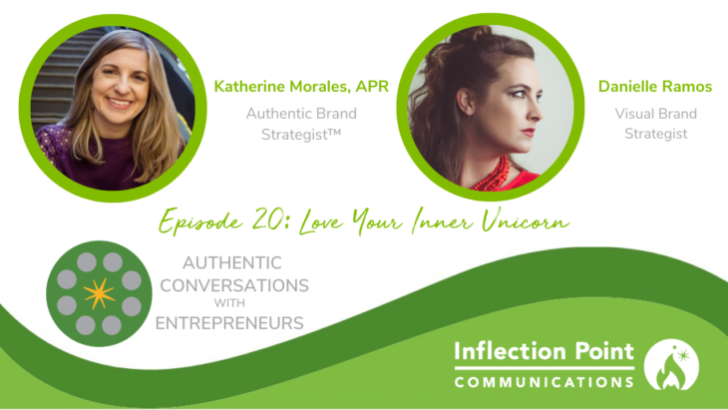In this second episode of “Authentic Conversations with Entrepreneurs,” I spoke with Complexity & Depth Coach™ Dori Klass of Dori Klass & Associates, as she shared her Authentic Story of devastating loss in her 20s, a lack of acknowledgment or empathy from her employer and how all of that led her on a journey to helping herself and others to “Be BIG” and say “YES to life!” This conversation is for entrepreneurs who have ever felt invisible… like they needed to be MORE or LESS of who they are for anyone, OR if being ALL of who they are ever felt scary or hard somewhere in their journey of entrepreneurship.
Katherine Morales: Hi, everyone. Welcome to the second episode of Authentic Conversations with Entrepreneurs. I’m here with Dori Klass, Complexity and Depth Coach, founder of Dori Klass and Associates, and the Whole Person, Whole Power program. So I’m Katherine Morales, Authentic Brand Strategist, Founder of Inflection Point Communications.
And you’re probably wondering what Authentic Conversation is, well, it’s all about sharing the journey of entrepreneurship. I think it’s all about humanizing that journey and exploring what it looks like for different entrepreneurs. So today we’re here with Dori Klass and we are talking about BEING BIG, but it’s not the kind of big you’re probably thinking so I can’t wait to dive into this with you, Dori. So what does this phrase actually mean to you? When’s the first time you heard it? Enlighten us.
Dori Klass: Well, I’d say my first association with the word BIG could even go back to when I was in fifth grade. I was the size I am now, I was five feet, seven inches and a head taller than everybody around me. I literally had a sense of being very BIG. But I was surrounded with lots of big people and lots of big personalities. And it was an interesting dynamic because there’s an expectation that you show up and meet that energy. But on the other hand, that you stand down and let them shine.
And because I was as a child especially, I was precocious and curious and I asked a lot of questions. And that wasn’t always appreciated, or it was perceived as being anti-authoritarian or as something. And so there was this, “Stop being so big, stop pushing so hard, stop asking for so much.” There was just a lot of tamping it down. And so I had this not very healthy or positive relationship with big, like BEING BIG is wrong or it’s being selfish or it’s taking up too much space. And that was my five-year-old, or 12-year-old or 16-year-old mind made up. Those were the stories I made up. Whether that was true or not was a whole different issue.
Katherine Morales: Yeah. Did that follow you into adulthood? How did that take shape as you got older?
Dori Klass: Yeah, there’s always that challenge of when in Rome do as the Romans do, and it’s a biological imperative to fit in and be part of the communities we’re a part of to the extent we’re able. The challenge is when we lose ourselves in the process, or when we kind of forget who we are in the middle of that, or when there’s a reaction to some aspect of who we are and then in the process, we start to have a reaction to it, right? Because it can threaten fitting in. A lot of this is all happening very unconsciously, but it happens so that part of me that would push the envelope or ask questions as curious. I didn’t understand until much later even in my corporate life how much that was a strength too depending on the situation and who you were with.
Like when I was in strategic planning, it was exactly what was needed. It was why I flourished there. So that’s part of the work is having a relationship with these parts of ourselves, our bigness, our smallness, our powerfulness, our powerlessness and getting out of the stories we make up about it and just feeling those things and then asking if it’s true.
Katherine Morales: You had a personal experience though where you just had a turning point for you, can you share some about that?
Dori Klass: Yeah, there were a lot of different experiences, but two personal experiences in my life that were really substantive were when I lost my sister to suicide. I was 24, she was 18, it was tragic and changed everything for me, for us, for my family, for people who knew her. But what was really interesting is when people like myself or anybody else goes through these kinds of big events or losses, is what everybody does with that around us after it happens. And so I took a little bit of time off from work, the tiniest bit of time and then I went back to work. And one of the things that I’ll remember till the day I die, because it just hit me so deep in my core was re-entering my workplace, going into Boston for a district meeting and not having a single person acknowledge that it had happened, acknowledge my sister, acknowledge the death, acknowledge me, there were no cards, no flowers, no mention.
People have a hard time with suicide, people have a hard time with death, people have a hard time with loss of any kind and so I understand all of that, but it still didn’t change just how deeply invisible I felt and how empty I felt and how much I became aware of the unspoken need for things like this to stay in the background and not be brought into certain spaces or that we just didn’t have the capacity to deal with our whole lives and the rest of what was happening. And not that we want that to be front and center or usurp the intention of the meeting or anything else, but we’re whole people with whole experiences and whole lives, and some places are better at acknowledging that than others. But that moment for me was horrifying.
Katherine Morales: I can only imagine.
Dori Klass: And I was just thinking, how can we be in a world full of so many people bumping into each other all the time and not SEE each other?
Katherine Morales: Definitely. It’s interesting because you use the word invisibility, which I can totally see how you felt that way. And I think that whether in circumstance or others, you hear all the time that in entrepreneurship, everyone wants to be seen and heard, is that what BIGNESS is about?
Dori Klass: For me, it is, it’s about going on that inner journey to WHOLENESS and really knowing your whole self, whether or not you like all the things you see or all the parts within. It’s about getting to know who’s there and what I find in my own journey in this, because I took myself on this journey myself and it’s kind of what-
Katherine Morales: After that experience, right? You’re like, “I’m out of here.”
Dori Klass: It’s what led to what I now call Whole Person, Whole Power, my multi-year coaching program. But in my own journey, it was about turning toward those voices, getting to know who’s here, starting to have a relationship with each of my parts, the ones I prefer and the ones I don’t.
Katherine Morales: Voices within.
Dori Klass: Yeah. And then now that I’ve done that, and it’s a lifelong journey, but now that I’ve done a lot of that really intensively, I can call on each of these parts, I can channel their energies and their gifts because they each have gifts in service of whatever is up for me, whether it’s for me, within my marriage, with my children, with my clients, just in the world as a neighbor, I can call these forth. I say this as an illustration of parts, if you have a heart surgeon, they need to be able to do harm literally, they need to cut through the chest, break open-
Katherine Morales: So graphic.
Dori Klass: Go through the heart, slice it open, do that, they have to actually harm to heal. So they have to be in touch with that capacity to penetrate so deeply.
Katherine Morales: So there’s the complexity for you.
Dori Klass: There you go, right?
Katherine Morales (08:23): Yeah.
Dori Klass: They’re stuck together. So when I have a relationship with my BIGNESS or my WHOLENESS, that also means I’m having a relationship with a part of me that feels small sometimes, that is desperately needy, that doesn’t have competence in some areas or needs to rely on others for some things, or is sad today. It’s knowing that I have all of these parts; I’m not just one thing or another.
Katherine Morales: I love that. I mean, yeah, when you recognize that you have all these parts and all these voices and each one has equal value or worth, I think it’s easy to know that you’re BIG, right? So what advice would you give to our viewers and our listeners about how to get in touch with their BIGNESS, how to really embrace their whole selves? Because I know there are those moments for entrepreneurs when maybe you feel like you need to be more or less of who you are, but how do you guide your clients and what advice would you give to them to embrace all of those parts?
Dori Klass: Well, I guess there’s a few things.
Katherine Morales: That’s a loaded question so take your time. A very passionate question.
Dori Klass: I think the first thing I’d say is you have to decide if you want to. I mean, nothing happens without a decision and I mean like YES with capital letters decision, right? Yes with the capital Y or small letters is a no.
Katherine Morales: Yeah, I love that.
Dori Klass: So first we have to decide we want to, we have to get curious. And then second, I’d say we have to find the courage to look within. And for a lot of us, we’re struggling with trust, trust of anyone including ourselves, but we do have to trust that we’re going to love who and what we find. And I know that. I mean, I’ve just done the work so much with my own children, with my clients, with friends. I mean, I just know we can love who and what we find. And even if we don’t prefer all of it, we can have compassion for our younger self and we can get to know our inner critic and our persecutor and go, “Ha, why are you here today? And what should I be paying attention to?”
We can interact with them and have a relationship with our parts and let them be messengers, but we have to learn to listen. So one, we have to decide we want to, two, we have to have the courage to look within, and three, we have to get curious about who and what we find. And what I find probably four, and maybe it’s a little self-serving to say it, but mostly we’re stuck in our stories that we’ve been honing for decades. And it’s really hard to break out of that even if intellectually, we know we need to. And so we can’t see what we can’t see so we need to be in conscious relationships or conscious communities where there’s a commitment to holding each other BIG and to holding each other in general and being able to articulate what we’re seeing that we can’t see ourselves.
Then we have to be willing to listen. So there’s kind of, I call it holy witnessing and holy listening, but we have to be willing, we need each other to do this work. And so whether it’s you and me in a dynamic for business and marketing and authentic branding purposes, which has turned into also a beautiful friendship, or it’s me with my clients, or it’s also with friends. But the friend relationship is different than the client-coach relationship, for example. So I think, that decision, the courage to look within, the curiosity again, bringing that way back. And then entering into some a partnership, reparative relationship, coach, client dynamic, whatever it is that helps you-
Katherine Morales: Don’t take that journey alone.
Dori Klass: It helps you go deeper and see better. And be seen. I mean, it is vulnerable, it’s a risk to be seen.
Katherine Morales: As I say, authenticity is vulnerability and yeah, when you get to the core of you, that requires you to be your whole authentic self. So if we can, I imagine I want to go back for a minute because I’m sure that people are curious what happened after you entered the office and everyone was radio silent, because I can only imagine in this pandemic that obviously there have been a lot of losses. And so I can imagine, granted it is not suicide, but loss is loss and to know within these corporate cultures how to handle that, how did you handle it and what would you say to corporations managing this environment and different losses within their teams?
Dori Klass: I’m feeling emotional actually as you’re asking the question because I didn’t handle it well. I did a lot of things that were, one might argue in retrospect, were dangerous. I made bad choices. I withdrew. I did all the things we do when we’re in deep distress and we’re trying not to feel all those feelings and all the ways we numb ourselves that are rarely constructive. And so I’m not proud of that and I’m not proud of getting so stuck in those patterns that I probably sent a few people to therapy myself. I wasn’t my best self in relationships. I feared relationships, I struggled with trust. It took a really long time. And I did kind of do what I see a lot of young people doing right now is digging their heels and saying, “I don’t need anybody” powering through.
Katherine Morales: The independence.
Dori Klass: And we are a culture that’s all about fierce independence and lone wolf and we buy into the stories that they’re self-made whatever it’s all a bunch of hooey because nobody has-
Katherine Morales: Yeah, we all need to realize, know we need each other.
Dori Klass: Yeah, nobody got that all by themselves. It’s a nice story, but it’s not true. And so I had to crash and burn, I did. I had to crash and burn and I probably took a few people with me and I’m not proud of that. And maybe we all have to go through that. But the thing that I think made the difference for me is at some point I just said, when my sister died, the night that she died, I was in her bedroom in her fiance’s house. I mean, it was just strange, could’ve made a bad B movie. And I literally, I’m looking at her wedding dress hanging on the transom because that’s what we were there for to go to her wedding, and we ended up at her funeral. And I was distraught, but I was alone. That was my family’s dynamic. Everything was silence.
And I really experienced that silence as a kind of violence. We were not there for each other in our deepest, darkest moment and that’s very sad. But in that night when I couldn’t sleep, I did, I said, “God, if there is a God, please give me something. I need something.” And I did, I heard four words, “Say YES to life.” And I heard it literally, I believe it came from deep within, but it was like a booming voice like a command saying-
Katherine Morales: Yeah. Capital Y yes.
Dori Klass: Say yes to life. and my response was, “I have no clue what that means. I have no clue how to do it, but okay.”
Katherine Morales: But you’re curious.
Dori Klass: So okay, because I don’t know what else to do anyway. And so I was 24 and I put a stake in the ground and said, I’m going to figure out how to say yes to life. And it was a clunky process for way too long, but that’s been my journey and every morning I get up now, it’s part of my morning meditation and my mantra. The feet hit the ground and it’s like I consecrate my life to saying yes to life, love and joy. No matter what life brings; no matter what life brings. I get to have a preference but in the end, who cares? My job is to turn toward life and say yes, and in the process, that’s what I help a lot of people do.
Katherine Morales: I love that, Dori. I absolutely love that. So what, if anything, can we offer our viewers because I know they want more, where can they go?
Dori Klass: Well, for me, everything right now tends to be one on one or eventually I’ll be maybe reinvigorating a Facebook-based community. But for right now, the best place to reach me is probably at my website, go check out my website.
Katherine Morales: Easy, doriklass.com.
Dori Klass: Yep, doriklass.com, my name, Klass with a K, and I am working with you as you know on my rebrand and I’m really looking forward to the rebrand launch of this site, which I don’t have anything to invite people to yet, I don’t have a link yet, but save the day, everybody, March 9th, noon Mountain Standard Time for about half an hour, I’ll be doing a rebrand launch live and would love it if you join me and help me celebrate this journey I’ve been on and that is in service to the people I’m meant to serve.
I see this saying yes to LIFE and saying yes to your BIGNESS, saying yes to becoming WHOLE, saying yes to having a healthy relationship with power and being powerful and using our power well, all of that is a result of some of the hardship I’ve been through in the work I’ve done over many years. And now I see that as a form of leadership, it’s self-leadership and self-mastery. And the people I work with are seasoned, successful professionals who want to be more of the empowered and visionary leaders they aspire to be and have the impact they intend, not leave dead bodies in their wake or just-
Katherine Morales: Crash and burn.
Dori Klass: Or they’re leaving all this potential on the table that they haven’t tapped into. And most of it has to do with who we’re being, how we’re showing up and how we’re relating to one another. But doing stuff, what we do, we do well, we get that. It’s all the rest.
Katherine Morales: Oh yeah, really relating, yeah.
Dori Klass: It’s time to see and be seen. It’s time to-
Katherine Morales: Yes, yes. Well, here’s where they can find you on LinkedIn, right?
Dori Klass: Yeah. Definitely. Definitely.
Katherine Morales: The invite’s not out yet, right, but you’ll share it there, right?
Dori Klass: Yeah, I’ll put notices on LinkedIn, I’ll put notices probably on Facebook, but just save the date March 9th, noon MST.
Katherine Morales: I love it. I love it. if you’re curious about more of Dori’s story, you can find it on my website here, it’s under the Insights section. But I want to thank you so much story Dori for truly showing up authentically, that does take courage and I call it standing in the heart of your fire and you did that beautifully. So I’m sure so many learned a lot and just it’s like a breath of fresh air to have a real true conversation. So thank you for sharing your story and how that journey has led to your beautiful business. And it’s been beautiful working with you and seeing that BIGNESS shine. So you can check our next episode out on March 17th with Brian Perry; he’s a good friend of ours.
Dori Klass: Very good guy.
Katherine Morales: He’ll be talking… Yeah, so you don’t want to miss that. He’ll be talking about Standing in Your Arena. So we all need to hear more of that. But for now, thank you so much and thanks, Dori.
Dori Klass: You’re welcome. Thank you, Katherine.
Katherine Morales: Bye.
Dori Klass: Bye.
